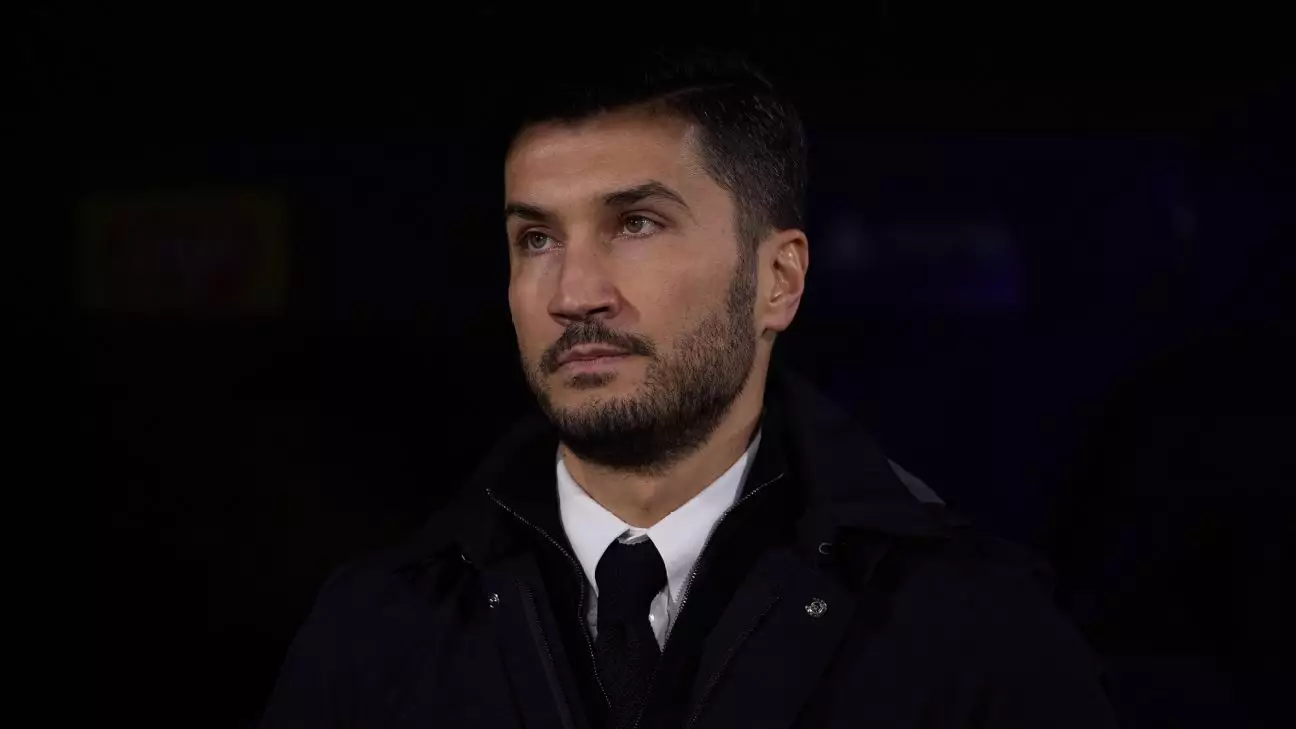The recent dismissal of Nuri Şahin from his managerial position at Borussia Dortmund reflects a tumultuous chapter in the club’s recent history. Having initially joined as an assistant to Edin Terzić, Şahin stepped up to take the helm after Terzić’s departure in a bid to instill a fresh identity within the team. However, as the dust settles on his short tenure, serious questions arise not only about his managerial capabilities but the broader issues plaguing the club.
Upon taking charge last summer, Şahin was charged with the significant task of revitalizing a side that, under Terzić, had struggled to maintain competitiveness in both domestic and European contexts. The club hoped that the promotion of a well-regarded former player could reignite the passion and performance levels necessary for a resurgence. Yet, reality struck hard. Following a 2-1 defeat to Bologna, Dortmund sits a disappointing 13th in the UEFA Champions League group phase, while languishing in mid-table of the Bundesliga. The alarming trend of consecutive losses against teams like Bayer Leverkusen, Holstein Kiel, and Eintracht Frankfurt painted a grim picture of a side unable to muster any semblance of form or confidence.
Contrary to the club’s aspirations, Şahin’s appointment has led to an observable regression in performance. This downturn raises uncomfortable questions about not only the effectiveness of the managerial staff but also the readiness of the squad itself to embrace change. The notion that Dortmund is now significantly worse than under Terzić reinforces the sentiment that perhaps Şahin was placed in a situation that was beyond his capacity as a fledgling coach.
An often-ignored element in such circumstances is the underlying squad quality and dynamics. Şahin’s decision-making was undoubtedly critical, but the players’ adherence to his style and tactical plans proved to be more challenging. Historically, Terzić’s tenure had seen Dortmund adopt a reactive style of play, particularly against more formidable opponents. In stark contrast, Şahin sought to bring a proactive approach focused on ball retention and coherent attacking plays. However, this evolution faltered early on, with the team unable to find rhythm or structure in their matches, culminating in substantial defeats that indicated a deep-rooted malaise.
Despite an influx of talent in past transfer windows, including the departure of key figures like Erling Haaland and Jude Bellingham, the current squad’s performances raise doubts regarding their mentality and tenacity. Matched with the challenges faced by new players attempting to integrate into a struggling team, it’s evident that Şahin’s dismissal is symptomatic of a larger problem within Dortmund—a pervasive culture of mediocrity that has set in over recent seasons.
As Dortmund seeks a replacement, names like Niko Kovač, Urs Fischer, and Roger Schmidt have surfaced as potential candidates. Regardless of who takes over next, it’s crucial that they implement immediate changes in both philosophy and personnel. The common thread through appointing multiple managers since 2018 suggests a failure to address the root causes of Dortmund’s prolonged underperformance. A short-term hire, as could be the case with Kovač, may provide temporary relief, but a strategic overhaul is vital for restoring the club to its former glory.
The narrative surrounding Şahin’s tenure should not only focus on the negative aspects of his managerial ability but also highlight the inherent responsibility of the squad and those in charge of recruiting and supporting the team. Fans and club officials alike had high hopes for Şahin, a well-liked figure, but enthusiasm can only sustain a journey so long before results must dictate reality.
Burdened with the weight of expectations, Borussia Dortmund now finds itself at a crossroads. Recent managerial changes signal urgent action, yet the risk remains that such turbulence could usher in a broader cycle of instability. What’s clear is that while managers may come and go, the club’s identity and its ability to evolve and compete at the highest level hinge critically upon a cohesive plan. Addressing mental fortitude and player performance will be as crucial as hiring the right managerial candidate. Until those foundational issues are resolved, one wonders whether Dortmund can escape the cyclical nature of disappointment that has haunted them in recent years.

